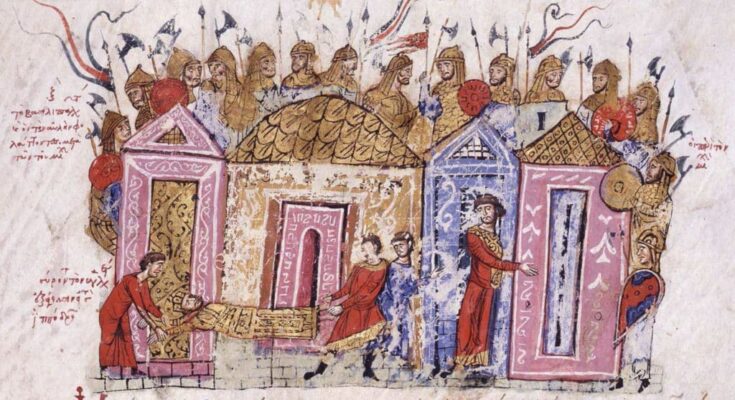
The Vikings were a seafaring people from Scandinavia. They most famously raided in and around the British Isles and the western coasts of Europe. However, what many people do not know is that they were active much further east, too.
The Vikings played a surprising yet significant role in the Byzantine Empire, where they formed the Varangian Guard. What do we know about the Varangian Guard, the Vikings of the Byzantine Empire?
The Origin of the Varangians
The Varangians were Vikings from Sweden. In the ninth century, a group of them settled in Northwest Russia, where the city of Novgorod is located today. A man named Rurik was the legendary leader of this group. He was referred to as the Rus’, and the settlement, established in the year 862 according to a twelfth-century chronicle, was likewise referred to as such.
From Novgorod, the Varangians went on south towards the Black Sea. In addition to Russia, they settled in modern-day Belarus and Ukraine. Over time, they began to dominate the trade passing through that area. This was a critical position of commercial power. There was much trade that passed from the Muslim territories of the east to the Byzantine Empire of the west.
At times, there were military conflicts between the Varangians and the Byzantine Empire. In the tenth century in the year 907, the Varangians attacked Constantinople itself. The siege does not appear to have been particularly bloody, and it ended in a peace treaty between the two sides.
Varangian Guard: the Viking mercenaries of the Byzantine Empire
As a result of this and other peace treaties with the Byzantine Empire, Varangians from the Rus’ people received the right to serve in the Empire. Perhaps because it brought the prospect of greater wealth and security, many Varangians chose to do just that. This formed what is now known as the Varangian Guard.
The Varangian Guard was thus a group of Viking mercenaries serving in the Byzantine Empire. From the tenth century onwards, more and more Varangians began associating themselves with the Byzantine emperor. Many of them came directly from the Rus’ people living north of the Black Sea, but there were also many immigrants directly from Sweden.
The Varangian Guard was highly valued by the Byzantine emperor. Because they were foreigners to the Empire, they were far less likely to get involved in political or national intrigues. For this reason, members of the Varangian Guard were often favored as personal bodyguards for emperors, similar to the Praetorian Guard of previous centuries. In addition, they also participated in open warfare against enemies of the Empire.
The Function of the Varangian Guard
The Varangian Guard swore utter allegiance to the emperor. They vowed to protect him at all costs as needed. Due to their culture, the people of Scandinavia, including the Anglo-Saxons, were renowned for their loyalty. They had an incredible reputation for sticking to their oaths. Therefore, the emperor could trust them with his very own life.
Beyond simply acting as guards for the emperor, the Varangians also performed ceremonial duties within Constantinople. In times of political unrest or conspiracies, they would act as a kind of special police force.
In general, Vikings were famous for their ferocity in warfare. This aspect of the Varangians was not lost on Byzantine emperors. If a battle got to be too much for the Empire’s own forces, they would send in the Varangian Guard to provide support.
The famous Scandinavian berserkers gave the Varangian Guard a fierce reputation in battle. Supposedly, they fought like fearsome beasts and took no note at all of their wounds or pain. The broad-bladed Dane axe was their weapon of choice.
The History of the Guard
Although originally composed of only Vikings from Scandinavia, Anglo-Saxons later joined the Varangian Guard in the eleventh century. This was after the Norman conquest of England in 1066. This conquest drove out many of the Anglo-Saxons who had been living there. They traveled for new prospects, and this led them to the Byzantine Empire. There, they joined the Vikings in the Varangian Guard.
The Guard played a key role in a number of vital battles. For example, in the eleventh century, the Lombards and Normans attempted to drive the Byzantine Empire out of Southern Italy. In response, the Byzantine Emperor sent a body of troops taken from the Varangian Guard to Italy. During the resulting Battle of Cannae, the Varangians helped the Empire to achieve a decisive victory.
The Varangian Guard continued to protect the Empire, especially the capital, Constantinople, throughout the thirteenth century. However, after the middle of that century, they disappeared from the written record. They last appear escorting a prisoner of war to Nicaea in 1259. No one is aware of what happened to them from that point on.



